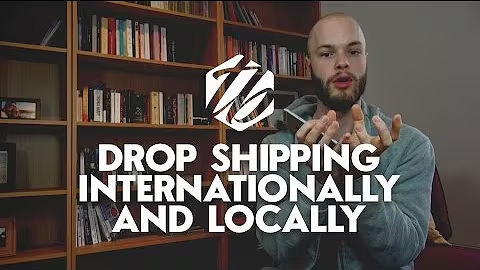$0 Cost to Start Your Own Private Label Business!
Table of Contents:
- Introduction
- What is a Private Label Company?
- Examples of Successful Private Labels
- The Benefits of Starting a Private Label Company
- How to Start Your Own White Label Company
5.1. Find a Supplier or Manufacturer
5.2. Create Your Brand and Product Label
5.3. Register Your Business and Obtain Necessary Certifications
5.4. Set Up Your Online Store or Retail Channels
5.5. Market and Promote Your Products
5.6. Fulfillment and Shipping Processes
- The Cost of Starting a Private Label Company
- Challenges and Risks of Private Labeling
- Tips for Success in the Private Label Industry
- Conclusion
How to Start Your Own Private Label Company and Make Money Online
Are you interested in starting your own business and making money online? Have you ever heard of private label companies? In this article, we will explore what private label companies are and how you can start your own white label business without investing any money upfront. From finding the right supplier to marketing your products, we will guide you through the step-by-step process of setting up your own private label company. So, let's dive in and discover the world of private labeling!
1. Introduction
Starting a business can be an exciting and rewarding venture. However, it often comes with high startup costs and risks. This is where private label companies offer a unique opportunity. With a private label business, you can leverage existing products or manufacturing capabilities to create your own brand. In other words, you can sell products that are already being produced, but with your own personalized branding. This allows you to enter the market quickly and at a much lower cost compared to developing your own product from scratch.
2. What is a Private Label Company?
A private label company, also known as a white label company, is a business that sells products manufactured by another company under its own brand name. The products are typically produced in bulk and then labeled and packaged with the private label company's branding. The private label company is responsible for marketing, sales, and distribution of the products. This business model allows entrepreneurs to focus on branding and building a customer base without the need for product development and manufacturing.
3. Examples of Successful Private Labels
You may be familiar with some popular private label brands without even realizing it. For instance, celebrities like Kylie Jenner and Dwayne "The Rock" Johnson have successfully launched their own private label products. Kylie Jenner's makeup line and The Rock's energy drink are examples of private label products that have gained immense popularity. These products are often manufactured in the same factories as other similar products but with unique branding and marketing strategies. Private label companies can thrive by capitalizing on the influencer's personal brand and existing customer base.
4. The Benefits of Starting a Private Label Company
There are several advantages to starting a private label company. First and foremost, you can bring your brand to market quickly without investing in product development. By leveraging existing products, you can focus on branding and marketing strategies to differentiate yourself from competitors. Additionally, private label products often have higher profit margins compared to reselling third-party products. You have control over the pricing, packaging, and presentation of your products, allowing you to provide a unique value proposition to your customers.
5. How to Start Your Own White Label Company
Now that we understand the concept of private label companies, let's explore the step-by-step process of starting your own white label business.
5.1. Find a Supplier or Manufacturer
The first step in starting a private label company is to find a reliable supplier or manufacturer. You will need to source products that align with your target market and meet quality standards. Research potential suppliers, compare prices, and request samples before making a final decision. It's crucial to establish a strong partnership with your supplier as they will be responsible for manufacturing and delivering your products.
5.2. Create Your Brand and Product Label
Once you have chosen your products, it's time to create your brand identity and product labels. This includes designing a logo, selecting packaging materials, and creating product labels that reflect your brand. Consider hiring a graphic designer or utilizing design tools like Canva to create professional and eye-catching labels. Your branding should resonate with your target audience and convey the unique value your products offer.
5.3. Register Your Business and Obtain Necessary Certifications
Before launching your private label business, you need to register your company and obtain any necessary licenses and certifications. This ensures that your business is legally compliant and meets all regulatory requirements. Depending on your location and the nature of your products, you may need to register for a business license, sales tax permit, or certifications related to product safety and quality.
5.4. Set Up Your Online Store or Retail Channels
To sell your private label products, you will need an online store or retail channels. Setting up an e-commerce website using platforms like Shopify can provide you with a user-friendly and customizable storefront. You can display your products, manage inventory, and process orders seamlessly. Alternatively, you can explore existing retail channels or collaborate with established online marketplaces to reach a wider customer base.
5.5. Market and Promote Your Products
Marketing and promoting your private label products are essential for attracting customers and generating sales. Utilize social media platforms, influencer marketing, and targeted advertising to raise awareness about your brand. Engage with your audience through valuable content, customer testimonials, and special promotions. Building a strong online presence and leveraging digital marketing strategies will increase the visibility and credibility of your private label company.
5.6. Fulfillment and Shipping Processes
As orders start pouring in, you need to ensure a smooth fulfillment and shipping process. Depending on your preferences and capabilities, you can either handle the fulfillment in-house or outsource it to a third-party logistics provider. Carefully choose packaging materials, invest in reliable shipping services, and provide transparent tracking information to your customers. Prompt and efficient order fulfillment will contribute to customer satisfaction and repeat purchases.
6. The Cost of Starting a Private Label Company
One of the significant advantages of starting a private label company is the low startup cost compared to launching your own product. You don't have to invest in extensive research and development, manufacturing equipment, or inventory. However, keep in mind that there are still costs involved, such as sourcing, branding, marketing, and operating expenses. Create a comprehensive budget that includes all expenses to determine the profitability of your private label venture.
7. Challenges and Risks of Private Labeling
While starting a private label company can be lucrative, it's important to be aware of the challenges and risks involved. The market can be highly competitive, and standing out from the crowd requires effective branding and marketing strategies. Quality control is another crucial aspect, as your brand reputation relies on delivering consistent and high-quality products. Additionally, unforeseen circumstances like supply chain disruptions or changing customer preferences can impact your business. Stay adaptable and continuously monitor the market to mitigate potential risks.
8. Tips for Success in the Private Label Industry
To succeed in the private label industry, consider the following tips:
- Conduct thorough market research to identify profitable product categories and target niches.
- Build a strong brand that resonates with your target audience and stands out from competitors.
- Create a compelling and consistent brand story to connect with customers emotionally.
- Invest in high-quality products and maintain rigorous quality control processes.
- Implement effective marketing strategies to reach and engage your target audience.
- Provide excellent customer service to build trust and loyalty.
- Continuously innovate and adapt to changing market trends and customer demands.
- Stay informed about industry regulations and compliance requirements.
9. Conclusion
Starting your own private label company can be an exciting and profitable venture. By leveraging existing products and focusing on branding and marketing, you can create a unique business that stands out in the market. Take the time to research and plan your private label journey, ensuring that you deliver high-quality products and exceptional customer experiences. With the right strategies and dedication, your private label company can thrive in the e-commerce landscape and pave the way for your entrepreneurial success.
Highlights:
- Start your own private label company without investing money upfront.
- Leverage existing products and manufacturing capabilities.
- Create a unique brand and market your products.
- Follow a step-by-step process to set up your private label business.
- Overcome challenges and mitigate risks in the private label industry.
FAQs:
Q: Can anyone start a private label company?
A: Yes, anyone can start a private label company. It doesn't require a large capital investment or prior business experience. However, it's crucial to research the market, choose the right products, and develop effective marketing strategies.
Q: How much money do I need to start a private label business?
A: The capital required to start a private label business can vary depending on the products, branding, and marketing strategies. While the upfront costs are relatively low compared to developing your own product, you still need to budget for sourcing, branding, and operating expenses.
Q: Do I need a following on social media to start a private label company?
A: While having a following on social media can be beneficial for marketing and promoting your products, it is not a requirement to start a private label company. You can still build a customer base through other channels, such as online marketplaces or targeted advertising.
Q: Are private label products of lower quality compared to branded products?
A: Private label products can offer the same quality or even higher quality compared to branded products. It ultimately depends on the supplier you choose and the quality control processes you have in place. Conduct thorough research and select suppliers with a proven track record of delivering high-quality products.
Q: What are the advantages of starting a private label company?
A: Some advantages of starting a private label company include low startup costs, quick time to market, higher profit margins, and the opportunity to create a unique brand. It allows you to focus on marketing and building a customer base without the need for product development and manufacturing.



















